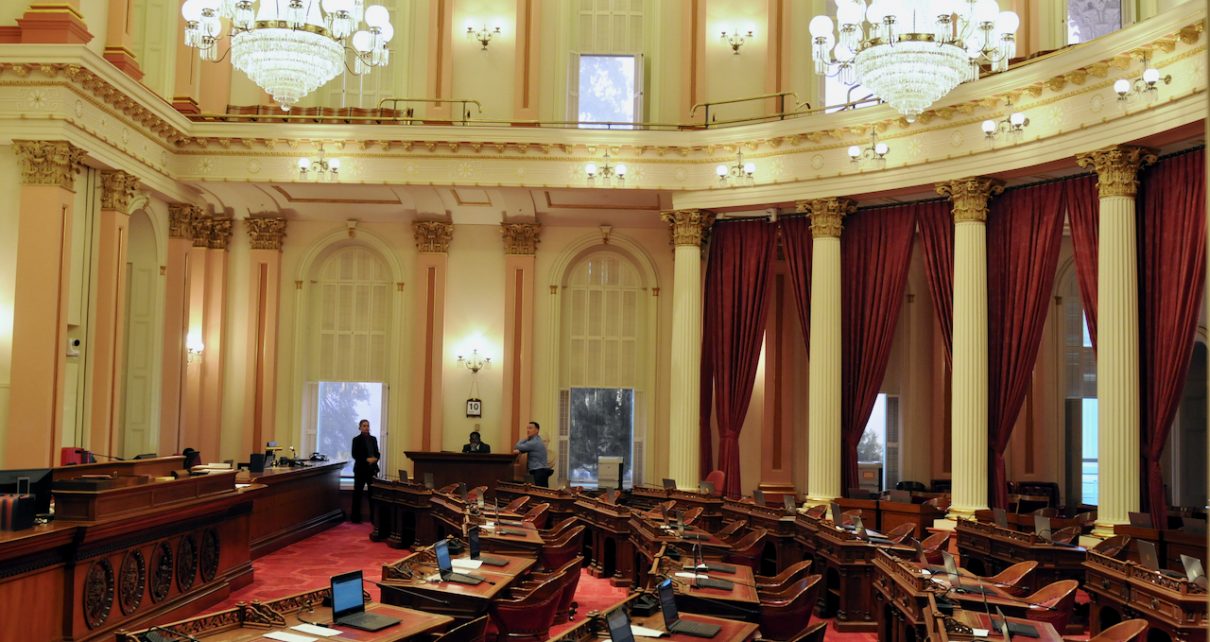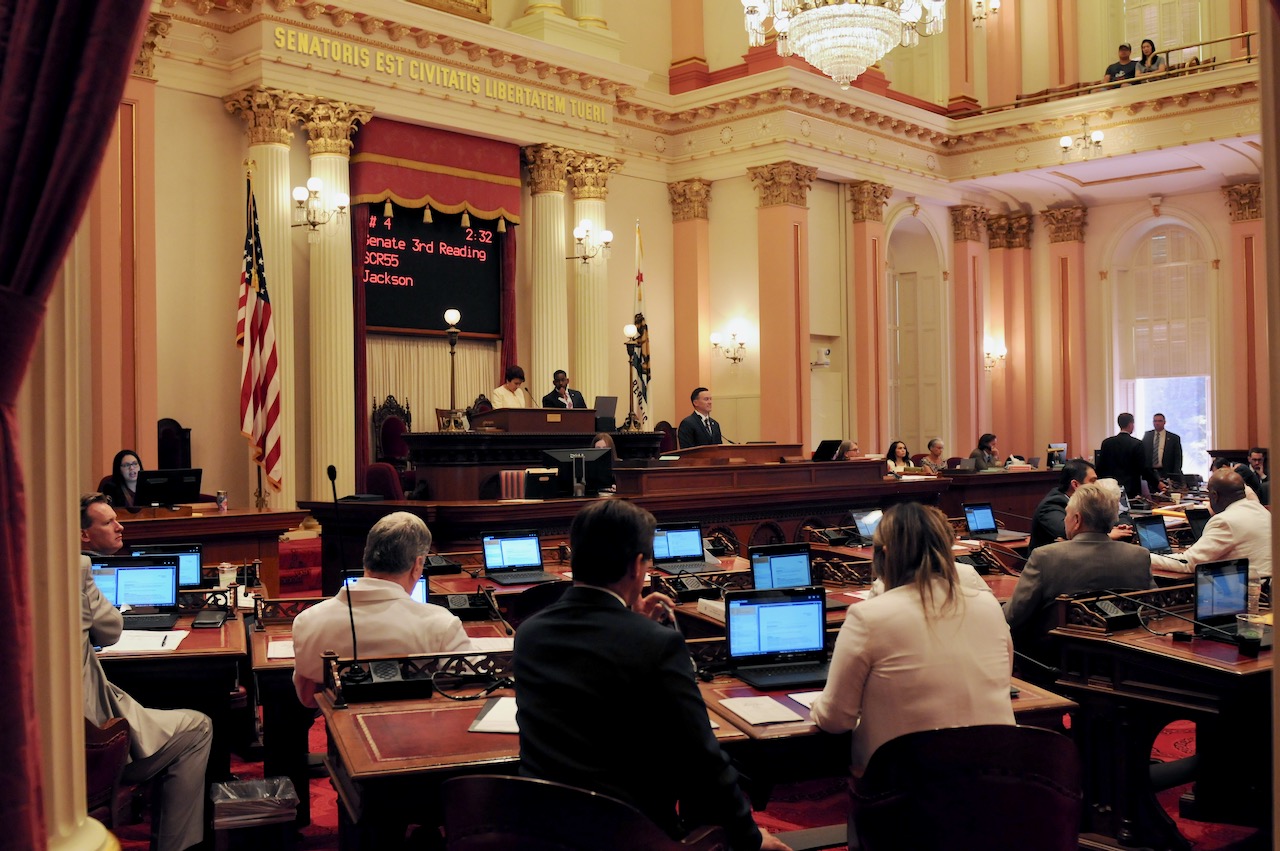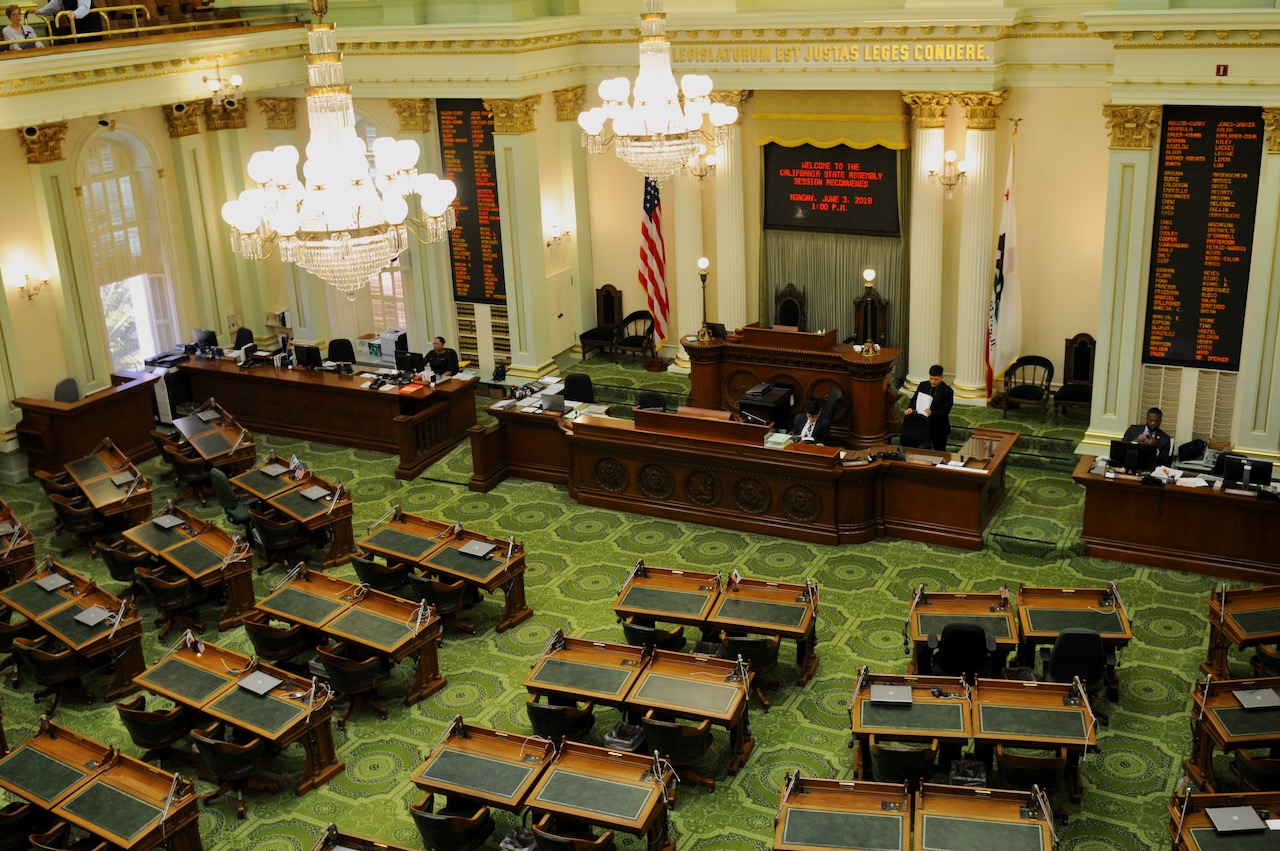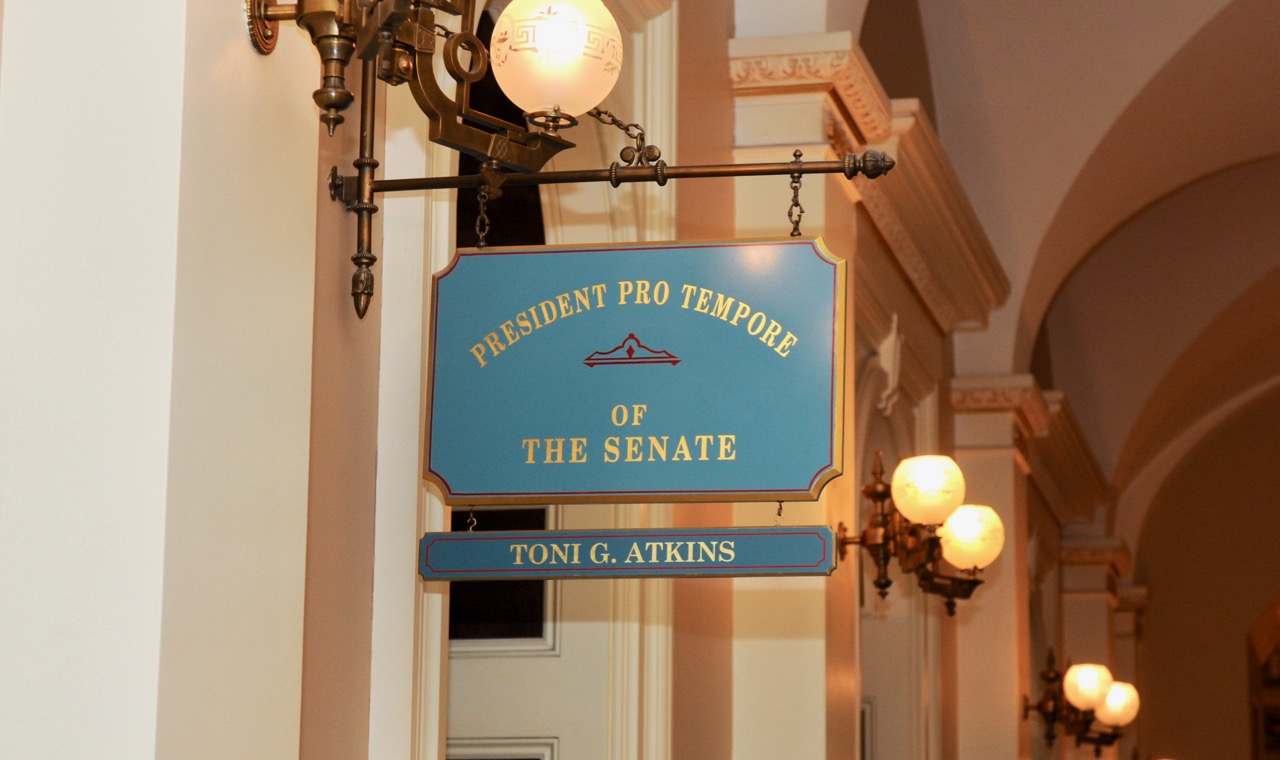
California Senate Chambers. (Photo: Kevin Sanders for California Globe)
Key Provisions of the Legislature’s Internal Rules – The Joint Rules – Part III
A conference committee may determine that it is unable to submit a report to the houses
By Chris Micheli, April 13, 2020 2:25 am
This is Part lll of Key Provisions of the Legislature’s Internal Rules – The Joint Rules – Part ll is here. Part I is here.
Conference Committee Reports – A conference committee report that recommends a bill be further amended requires the bill to be reprinted with the amendment(s). A conference committee report is not in order until the bill has been in print and noticed in the Daily File for at least one legislative day. If the report only recommends the amendments be concurred in, these consideration of the report is in order at any time and reprinting of the bill is not required, but notice in the Daily File of at least one day is required. A conference committee report is not in order unless the Senate Secretary and Assembly Chief Clerk have received them at least three calendar days preceding the commencement of the summer, interim or final recess. This rule may be suspended by a 2/3 vote of the house. (30)

Conference Committee Reports on Urgency Statutes – With a conference committee report that contains an urgency clause, the presiding officer first puts the urgency clause to a vote. If approved by a 2/3 vote, then the presiding officer puts forth whether the house shall adopt the conference committee report. If approved by a 2/3 vote, then the report is adopted. If either vote does not achieve a 2/3 vote, the effect is a refusal to adopt the conference committee report. (30.5)
Failure to Agree on Report – A conference committee may determine that it is unable to submit a report to the houses. That finding is submitted to the Assembly Chief Clerk and Senate Secretary in the form of a letter from the chair of the conference committee from the bill’s house of origin and the letter must contain the signatures of the conference committee members. Then the conferees are discharged and other conferees are appointed in their place. (30.7)
Authority When Rules Do Not Govern – All relations between the two houses that are not covered by the Joint Rules are governed by Mason’s Manual. (31)
Press Rules – A person must apply to the Joint Rules Committee to become an accredited press representative. The rule specifies required elements of the application and requires compliance with any Assembly or Senate rules. The press cannot assist anyone in the “prosecution of the legislative business” of others. The application is authenticated by the Standing Committee of the Capitol Correspondents Association. This group is to report any violations of press privileges. They are to be employed on a regular basis in the Capitol area preparing articles dealing with state government and politics, and not be involved in a legislative advocacy organization. This group controls the press seats and desks in the Senate and Assembly Chambers. Press cards are issued to these individuals. They may not perform for compensation any officials or candidates for office. (32)
Dispensing with Joint Rules – A joint rule can be dispensed with by a 2/3 vote of each house. If a joint rule is violated, the measure is returned to the house of origin and the disputed matter is considered in a conference committee. (33)
Dispensing with Joint Rules: Unanimous Consent – A joint rule that may be dispensed with by one house may be done by so unanimous consent if the Rules Committee of that house has approved doing so. (33.1)
Opinions of Legislative Counsel – Whenever Legislative Counsel issues a written opinion to any person other than the first-named author that analyzes the constitutionality, operation or effect of a measure that is pending of any amendment made or proposed, he or she is authorized to deliver two copies of the opinion to the first-named author as promptly as feasible. A copy of any Legislative Counsel opinion that advises a Member of a conflict between two or more bills is submitted to the policy committee chair. (34)
Resolutions Prepared by Legislative Counsel – When Legislative Counsel determines that a resolution drafting request will be similar to one already requested, Counsel must inform that Member. (34.1)
Resolutions – A concurrent or house resolution may be introduced to memorialize a death. Resolutions can be used for commendation, congratulation, sympathy, or regret with respect to any individual, group or organization. The Rules Committee must approve before introduction a concurrent resolution that requests the Governor to issue a proclamation. (34.2)
Identical Drafting Requests – When Legislative Counsel determines that a bill drafting request will be substantially identical to one already introduced, Counsel must inform that Member. (34.5)
Expense of Members – Each Member is entitled to reimbursement for living expenses while required to be in Sacramento to attend legislative sessions, while traveling to and from, or while attending any legislative function or responsibility as authorized or directed. The Assembly Chief Clerk and Senate Secretary certify expenses allowances to the Controller for payment to Members. (35)
Issuance of Subpoenas – A subpoena for a witness or the production of documents may be issues by the Senate Rules Committee, Assembly Speaker or the committee chair conducting an investigation only if permission has been secured from the Rules Committee. (35.5)
Investigating Committees – Either house or both houses jointly may by resolution or statute provide for the appointment of committees to ascertain facts and make recommendations as to any subject within the scope of legislative regulation or control. Each committee may employ clerical, legal and technical assistants. Each committee may adopt rules to govern its procedure. Each committee may subpoena witnesses and require production of documents of any kind. All state and local agencies, officers and employees must furnish to the committee any requested documents. They may meet at any time in public or executive session and do all things necessary to perform their duties, with specified exceptions when the Legislature is in session or in joint recess. Any requirements may be waived by the Joint Rules Committee. (36)
Expenses of Committee Employees – Employees of legislative committees are entitled to allowances in lieu of actual expenses for hotel and meal expenses from time-to-time. (36.1)
Appointment of Committees – Appointments can be made and vacancies filled in the manner provided by the Joint Rules whenever a joint committee is created by statute or resolution. The Assembly Speaker and Senate Rules Committee make their respective appointments. (36.5)
Appointment of Joint Committee Chairpersons – The chair of each joint committee, except JLBC and JLAC, is appointed by the Joint Rules Committee based upon a recommendation by the Senate Rules Committee and the Assembly Speaker. (36.7)
Joint Committee Funds – Each joint committee, except JLBC and JLAC, must expend funds made available to it. (36.8)
Joint Legislative Budget Committee – The Joint Legislative Budget Committee is created and is a continuing body. It must ascertain facts and make recommendations to the Legislature concerning the State Budget, the revenues and expenditures of the state, and the organization and functions of the state and its departments and agencies with a view to reducing the cost of state government and securing greater efficiency and economy. The committee has eight senators and eight assembly members. The committee can adopt its own rules and can create subcommittees. JLBC may render services to any investigating committee of the Legislature. JLBC may appoint a Legislative Analyst. The duties of the Legislative Analyst are specified in this rule. Reports are made available to Members of the Legislature and the Assembly and Senate Offices of Research. The Legislative Analyst receives requests from Members to conduct studies or provide information that falls with its scope of responsibilities and that concerns the administration of the government. JLBC must be notified of the study request and JLBC provides an estimate of the cost. The Rules Committee hears any resolutions requesting a study by the JLBC. (37)
Citizen Cost Impact Report – Any Member or legislative committee may recommend that the Legislative Analyst prepare a citizen cost impact analysis on proposed legislation. But the recommendation must first be reviewed by the Rules Committee, which makes the final determination as to which bills are assigned for preparation of an impact analysis. In selecting specific bills for assignment to the Legislative Analyst, the Rules Committee must request the Legislative Analyst to present an estimate of time and prospective costs for preparing the analyses. Only those bills that have a significant cost impact are assigned. The Rules Committee can provides funds to offset added costs to the Legislative Analyst. The citizen cot impact analysis includes the economic effects that the Legislative Analyst deems significant and believes will result directly from the proposed legislation. The report is delivered to the committee. The Legislative Analyst must submit at least once per year a report to the Legislature on the trends and directions of the state’s economy, and must list the alternatives and make recommendations regarding legislative actions that will ensure a sound and stable state economy. (37.1)
Joint Legislative Audit Committee – Joint Legislative Audit Committee is created pursuant to the constitution and Government Code. JLAC has seven Members of the Senate and seven Members of the Assembly. Four members from each house constitute a quorum of the committee and the number of votes required to take action on any matter. The chair of JLAC provides the requesting Member any report that was prepared by the Bureau of State Audits. (37.3)
- Summons in California Civil Actions - July 7, 2025
- Family Conciliation Courts in California - July 6, 2025
- California Family Mediation and Conciliation Services - July 5, 2025







